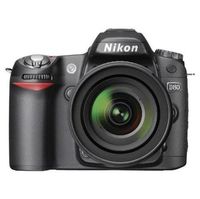Nikon D80 Digital Camera with 18-70mm Lens

-

Nikon D80 is a quantum leap over its predecessor the D70 and is positioned as a semi-professional SLR - right between the beginners D50 and the pros D200.
In this report we look at the array of advancements that Nikon had introduced with the D80. We further analyze reviews from more than 30 experts from across the Internet and look at what they have to say about the Nikon D80.
We finally give you some buying advice on the D80 and look at some other competitive models worth checking out.
The Nikon D80 debuts with a wide array of technologies both in hardware and software.
1. A new 10.2 effective mega-pixel CCD sensor in the DX format claimed by Nikon to capture images in sharp detail at higher resolutions.
2. A new high resolution image processing engine designed for accurate color reproduction resulting in more natural looking images.
3. The 3D Color Matrix Metering II designed to power automatic exposure control with high accuracy, especially in disparate lighting conditions.
4. A refined 11-area autofocus system claimed to ensure faster and accurate focusing even in difficult shooting conditions.
5. For fast shooting responses, the fast autofocus is combined with a claimed boot-up time of only 0.18 seconds and a minimal shutter release lag time of around 80 milliseconds.
6. A large 0.94x magnification viewfinder coupled with a large 2.5 inch 230,000 dot resolution LCD with an ultra-wide 170-degree viewing angle.
Most experts are wow-ed by the image quality of the Nikon D80 - more-so with a good lens attached. Almost all experts including the ones at CNet, Imaging Resource and DCRP (Digital Camera Resource Page) found the color rendition and the noise levels excellent.
More of the expert reviewers found the optical viewfinder very accurate. Imaging-Resource reported a 95-08% frame accuracy - varying depending on the zoom. CNet reported a small gripe with some noticeable vignetting at the wide end of the zoom range. Almost all reviewers gave a thumbs up to the low-light focusing and the autofocus also received much praise.
The LCD of the Nikon D80 was described as 'beautiful' by Imaging-Resource. This sentiment was shared by most other expert reviewers who also described it as bright, sharp and with great viewing angles. However the reviewers at Photo.net mentioned that the LCD is hard to view in sunlight due to the lacking of an anti-reflective coating.
The menu options were found pretty intuitive by most of the experts - though not everything is rosy here with DCRP griping about a confusing custom settings menu.
The battery life is pretty good according to most of the reviewers including TechRadar, Ken Rockwell and PCWorld. DigitalCameraResource mentions it as good enough for a whole day of shooting and PCWorld certifies it to be good enough for a pretty good 500 shots.
The ISO performance is generally good across the range, though slightly negative at higher ISOs, as noted by most reviewers. DCRP reported a noisy ISO 3200 while others noted muddier details starting at ISO 400. Though the experts at Photoxels found ISO 800 to 1000 still usable an Ken Rockwell was pretty happy even at ISO 1600.
Nikons refined new 11-area AF system really shines according to most reviewers and the DX format CCD sensor does it job well to produce astounding images with great color and detail.
The Nikon D80 shines out as a great package - combining great image quality, fast response times, accurate autofocusing,excellent viewfinder, great battery life and pretty good ISO performance.
Even though the D80 is a very formidable competitor in the mid range DSLR market, at the time of the writing of this report there are newer cameras out there providing more bang for the buck. In particular do check out the Nikon D7000, Canon 60D and the Sony SLT-A55 before going for the Nikon D80. On the upside, if you already own some Nikon lenses and are looking to upgrade to 10 Megapixel levels then the Nikon D80 is the one you should be looking at.
© 2025 ReviewGist.com. All Rights Reserved.
Nikon D80 Digital Camera with 18-70mm Lens